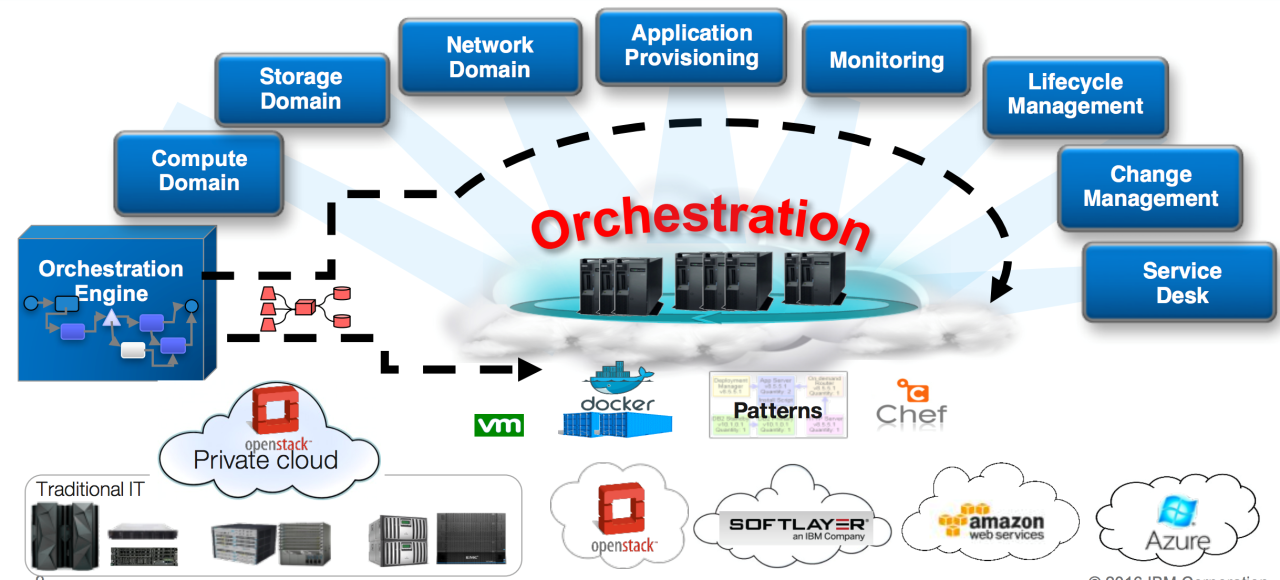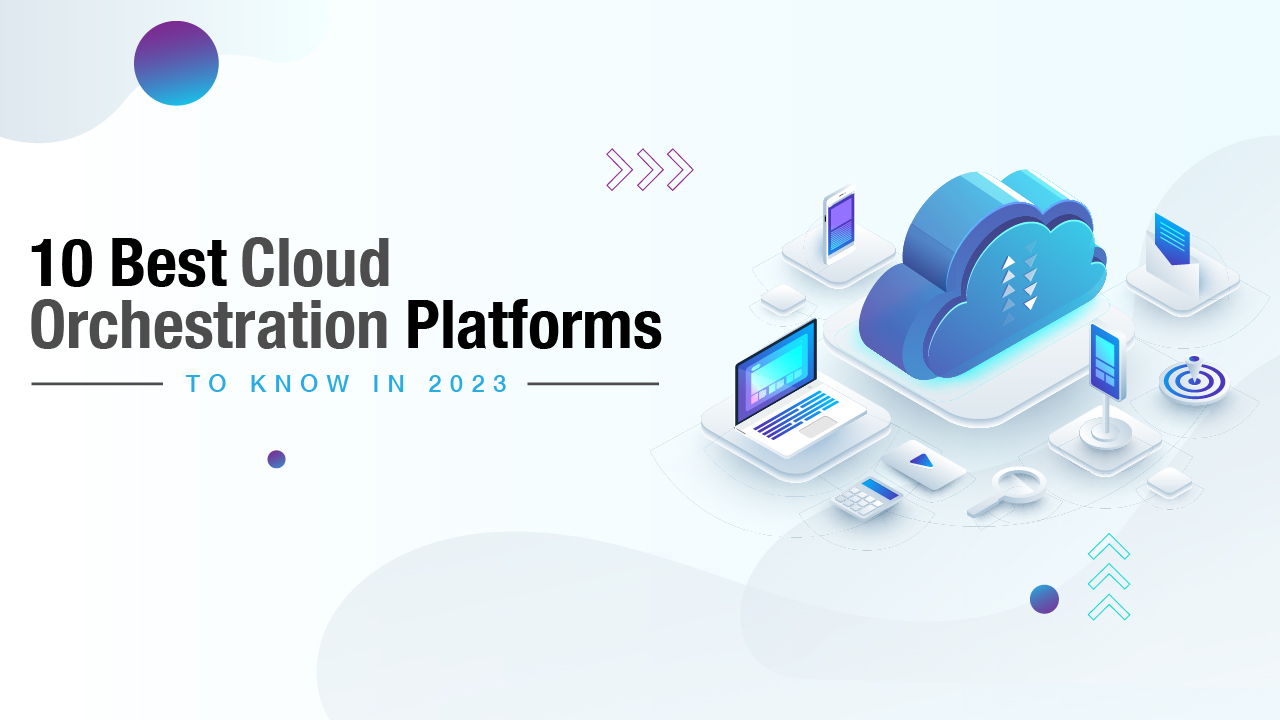In the ever-evolving realm of cloud computing, Cloud networking orchestration platforms have emerged as a game-changer, promising to revolutionize the way networks are managed and orchestrated. This comprehensive guide delves into the intricacies of these platforms, exploring their capabilities, benefits, and transformative impact on network management.
As businesses increasingly embrace cloud technologies, the need for efficient and agile network management has become paramount. Cloud networking orchestration platforms address this need by providing a centralized and automated approach to managing complex network infrastructures, enabling organizations to achieve unprecedented levels of control, visibility, and efficiency.
Cloud Networking Orchestration Platforms
Cloud networking orchestration platforms are designed to simplify and automate the management of network resources in cloud environments. These platforms provide a centralized interface for managing virtual networks, firewalls, load balancers, and other network components.
The benefits of using cloud networking orchestration platforms include:
- Improved network visibility and control
- Reduced network complexity
- Increased network agility
- Reduced costs
However, there are also some challenges associated with using cloud networking orchestration platforms:
- Complexity of platforms
- Vendor lock-in
- Security concerns
Key Components of Cloud Networking Orchestration Platforms
Cloud networking orchestration platforms are composed of several essential components that work together to manage network resources. These components include controllers, orchestrators, and virtual network functions (VNFs).
Controllers
Controllers are responsible for managing the overall network configuration. They communicate with orchestrators and VNFs to ensure that the network is configured correctly and that all devices are functioning properly.
Orchestrators
Orchestrators automate the deployment and management of VNFs. They receive instructions from the controller and deploy VNFs on the appropriate physical or virtual infrastructure. Orchestrators also monitor VNFs and ensure that they are running properly.
Virtual Network Functions (VNFs), Cloud networking orchestration platforms
VNFs provide specific network functions, such as firewalls, load balancers, and intrusion detection systems. They are deployed on physical or virtual infrastructure and are managed by the orchestrator.
| Component | Function | Interaction |
|---|---|---|
| Controller | Manages the overall network configuration | Communicates with orchestrators and VNFs |
| Orchestrator | Automates the deployment and management of VNFs | Receives instructions from the controller and deploys VNFs |
| VNF | Provides specific network functions, such as firewalls and load balancers | Communicates with the orchestrator to receive configuration updates |
The following diagram illustrates the interactions between the components of a cloud networking orchestration platform:
[Image: Diagram of the interactions between the components of a cloud networking orchestration platform]
Cloud networking orchestration platforms offer several advantages, including:
- Increased automation
- Improved efficiency
- Reduced costs
- Increased agility
- Improved security
However, there are also some disadvantages to using cloud networking orchestration platforms, including:
- Complexity
- Vendor lock-in
- Cost
Types of Cloud Networking Orchestration Platforms

Cloud networking orchestration platforms can be broadly categorized into two types: open source and proprietary solutions.Open source platforms, such as OpenStack Neutron and OpenContrail, are freely available and customizable, allowing users to tailor the platform to their specific needs. They offer flexibility and cost-effectiveness but may require additional expertise to implement and maintain.Proprietary
platforms, such as Cisco Application Centric Infrastructure (ACI) and VMware NSX, are developed and supported by commercial vendors. They provide pre-built solutions that are often easier to deploy and manage, but may come with licensing fees and limited customization options.
– Explain the key features and capabilities of cloud networking orchestration platforms, including automation, visibility, and security.
Cloud networking orchestration platforms are software tools that help businesses manage their cloud networks. They provide a centralized view of the network, automate network tasks, and improve security. Key features of cloud networking orchestration platforms include:
- Automation:Cloud networking orchestration platforms can automate a wide range of network tasks, such as provisioning, configuration, and management. This can save businesses time and money, and it can help to improve the accuracy and consistency of network operations.
- Visibility:Cloud networking orchestration platforms provide a centralized view of the network, which makes it easier for businesses to monitor and troubleshoot network problems. This can help to improve network performance and availability.
- Security:Cloud networking orchestration platforms can help businesses to improve network security by providing features such as access control, intrusion detection, and firewall management.
Benefits of using cloud networking orchestration platforms
There are many benefits to using cloud networking orchestration platforms, including:
- Reduced costs:Cloud networking orchestration platforms can help businesses to reduce costs by automating network tasks and improving network efficiency.
- Improved efficiency:Cloud networking orchestration platforms can help businesses to improve network efficiency by providing a centralized view of the network and automating network tasks.
- Increased agility:Cloud networking orchestration platforms can help businesses to increase agility by making it easier to provision and manage network resources.
Use Cases for Cloud Networking Orchestration Platforms

Cloud networking orchestration platforms are revolutionizing the way businesses manage their networks. These platforms provide a centralized platform for managing and automating network infrastructure, making it easier to provision, configure, and manage complex networks.
Here are a few examples of how cloud networking orchestration platforms are being used in real-world scenarios:
Multi-cloud Management
Cloud networking orchestration platforms can be used to manage multiple cloud providers from a single pane of glass. This allows businesses to take advantage of the best features and pricing from each cloud provider without having to manage multiple consoles and tools.
Network Automation
Cloud networking orchestration platforms can be used to automate network tasks, such as provisioning, configuration, and management. This can free up IT staff to focus on more strategic initiatives.
Network Visibility
Cloud networking orchestration platforms provide visibility into the entire network, including physical and virtual infrastructure. This allows businesses to quickly identify and troubleshoot network issues.
Network Security
Cloud networking orchestration platforms can be used to implement network security policies, such as firewalls, intrusion detection systems, and access control lists. This helps to protect networks from unauthorized access and attacks.
The benefits of using cloud networking orchestration platforms are clear. These platforms can help businesses to improve network efficiency, reduce costs, and increase security.
Design Considerations for Cloud Networking Orchestration Platforms
Implementing a cloud networking orchestration platform requires careful consideration of key design factors to ensure optimal performance and reliability. These factors include scalability, reliability, and security.
Scalability
Scalability is crucial for a cloud networking orchestration platform to accommodate the growth and expansion of the network. The platform should be able to seamlessly scale up or down to meet the demands of a growing or shrinking network. It should support a large number of devices and connections without compromising performance or stability.
Reliability
Reliability is paramount to ensure high availability and uptime of the network. The platform should employ redundant components and mechanisms to minimize downtime and data loss in the event of failures. It should have robust recovery mechanisms in place to quickly restore network functionality in case of disruptions.
Security
Security is a critical concern in cloud networking orchestration. The platform should provide comprehensive security measures to protect the network from unauthorized access, data breaches, and other security incidents. It should implement industry-standard security protocols, encryption techniques, and access controls to safeguard sensitive data and prevent malicious attacks.
Best Practices for Implementing Cloud Networking Orchestration Platforms
Implementing cloud networking orchestration platforms effectively requires careful planning and execution. Best practices include:
Planning and Design
Define clear goals and objectives for the platform, considering the specific needs and requirements of the organization. Conduct thorough assessments of the existing network infrastructure and identify areas for improvement.
Phased Implementation
Implement the platform in a phased approach, starting with a small-scale pilot project. This allows for testing, validation, and refinement before expanding to a larger scale.
Automation and Standardization
Automate as many network management tasks as possible to reduce manual effort and improve efficiency. Establish standardized policies and procedures to ensure consistency and reduce errors.
Security Considerations
Prioritize security throughout the implementation process. Integrate with existing security tools and implement robust authentication and authorization mechanisms.
Performance Optimization
Monitor network performance and identify bottlenecks. Utilize performance tuning techniques, such as load balancing and traffic shaping, to optimize network efficiency.
Cost Management
Track and monitor costs associated with the platform. Implement cost-effective solutions, such as cloud-native technologies and open-source tools, to optimize resource utilization.
Trends and Innovations in Cloud Networking Orchestration Platforms
The cloud networking orchestration platform market is constantly evolving, with new trends and innovations emerging all the time. These advancements are driven by the need for increased efficiency, agility, and security in cloud networks.
Some of the most important trends and innovations in cloud networking orchestration platforms include:
- Automation and AI-driven orchestration:Automation is essential for managing the complex and dynamic nature of cloud networks. AI-driven orchestration can take automation to the next level by providing insights and recommendations that can help network administrators make better decisions.
- Multi-cloud and hybrid cloud support:Many organizations are using multiple clouds or a hybrid of cloud and on-premises infrastructure. Cloud networking orchestration platforms that support multi-cloud and hybrid cloud environments can help organizations manage their networks more efficiently and effectively.
- Intent-based networking:Intent-based networking (IBN) is a new approach to network management that allows network administrators to define their desired network state and have the platform automatically configure and manage the network to achieve that state.
- Network programmability and APIs:Network programmability and APIs allow network administrators to automate network management tasks and integrate cloud networking orchestration platforms with other cloud services and applications.
- Security integration and zero-trust networking:Security is a top priority for cloud networking orchestration platforms. Platforms that integrate with security solutions and support zero-trust networking can help organizations protect their networks from cyber threats.
These trends and innovations are having a significant impact on network management. They are helping organizations to improve efficiency, reduce costs, increase visibility and control, enhance security, and gain greater flexibility and agility.
Leading cloud providers such as AWS, Azure, and Google Cloud are all investing heavily in cloud networking orchestration platforms. They are developing new features and capabilities to meet the evolving needs of their customers.
The future of cloud networking orchestration is bright. As the cloud continues to grow and evolve, cloud networking orchestration platforms will become increasingly important for managing complex and dynamic cloud networks.
Explain the role of cloud networking orchestration platforms in managing hybrid and multi-cloud environments, including their capabilities and benefits.

Cloud networking orchestration platforms play a pivotal role in managing hybrid and multi-cloud environments by providing a centralized platform to automate, manage, and secure network connectivity across different cloud providers and on-premises infrastructure. These platforms offer numerous capabilities and benefits that simplify network management and enhance performance in complex hybrid and multi-cloud environments.
Key capabilities of cloud networking orchestration platforms include:
- Centralized management and automation of network resources
- Visibility and control over network connectivity and traffic flow
- Enhanced security and compliance through centralized policy management
- Optimized network performance and resource utilization
- Reduced operational costs and improved efficiency
By leveraging these capabilities, cloud networking orchestration platforms enable organizations to effectively manage hybrid and multi-cloud environments, ensuring seamless network connectivity, enhanced security, and optimized performance.
Security Considerations for Cloud Networking Orchestration Platforms
Cloud networking orchestration platforms introduce a new layer of complexity to network management, which can create potential security risks. Understanding and mitigating these risks is crucial for ensuring the confidentiality, integrity, and availability of network resources.
One key security concern is the potential for unauthorized access to the orchestration platform itself. This could allow attackers to gain control of the platform and use it to manipulate network configurations or launch attacks on other systems. To mitigate this risk, organizations should implement strong authentication and authorization mechanisms, such as multi-factor authentication and role-based access control.
Another security concern is the potential for data breaches. Cloud networking orchestration platforms store and process sensitive network data, such as IP addresses, routing tables, and firewall rules. If this data is compromised, it could be used to launch attacks on other systems or to steal sensitive information.
To mitigate this risk, organizations should implement strong encryption measures and data protection policies.
Finally, cloud networking orchestration platforms can introduce new vulnerabilities into the network. For example, the use of automated provisioning and configuration tools can create opportunities for attackers to exploit vulnerabilities in the underlying software or infrastructure. To mitigate this risk, organizations should implement security best practices, such as regular security patching and vulnerability scanning.
Strategies for Mitigating Risks
- Implement strong authentication and authorization mechanisms.
- Implement strong encryption measures and data protection policies.
- Implement security best practices, such as regular security patching and vulnerability scanning.
- Use a cloud networking orchestration platform that provides built-in security features.
- Monitor the platform for suspicious activity and take immediate action to address any security breaches.
– Explain the relationship between cloud networking orchestration platforms and network virtualization.
Cloud networking orchestration platforms and network virtualization are closely intertwined. Network virtualization enables the creation of virtual networks that are independent of the underlying physical infrastructure. Cloud networking orchestration platforms provide the tools and capabilities to manage these virtual networks, including provisioning, configuration, and monitoring.By
leveraging network virtualization, cloud networking orchestration platforms can improve network agility and flexibility. Virtual networks can be created and deployed quickly and easily, without the need for complex physical infrastructure changes. This allows organizations to respond more quickly to changing business needs and to deploy new applications and services more efficiently.
Cloud Networking Orchestration Platforms and Software-Defined Networking (SDN)
Cloud networking orchestration platforms and software-defined networking (SDN) are complementary technologies that can be used together to manage network infrastructure more efficiently and effectively.
SDN decouples the control plane from the data plane, which gives network administrators more flexibility and control over their networks. Cloud networking orchestration platforms can be used to automate the provisioning, configuration, and management of SDN-based networks.
Benefits of using cloud networking orchestration platforms and SDN together
- Increased agility:Cloud networking orchestration platforms can automate the provisioning and configuration of SDN-based networks, which can reduce the time it takes to deploy new services.
- Improved visibility:Cloud networking orchestration platforms provide a single pane of glass into the network, which can help network administrators identify and troubleshoot problems more quickly.
- Enhanced security:Cloud networking orchestration platforms can be used to implement security policies across the entire network, which can help protect against threats.
Challenges of using cloud networking orchestration platforms and SDN together
- Complexity:SDN-based networks can be complex to manage, and cloud networking orchestration platforms can add to the complexity.
- Cost:Cloud networking orchestration platforms can be expensive to implement and maintain.
- Skills gap:There is a shortage of skilled network administrators who are familiar with both SDN and cloud networking orchestration platforms.
Despite these challenges, the benefits of using cloud networking orchestration platforms and SDN together can outweigh the costs. By automating the management of SDN-based networks, organizations can improve agility, visibility, and security.
Cloud Networking Orchestration Platforms and Network Function Virtualization (NFV)
Cloud networking orchestration platforms play a crucial role in managing Network Function Virtualization (NFV). They provide a centralized platform to automate the deployment, configuration, and management of virtual network functions (VNFs) in a cloud environment. This enables network operators to quickly and easily deploy and manage complex network services without the need for dedicated hardware.
Benefits of Using Cloud Networking Orchestration Platforms for NFV
- Reduced costs:By eliminating the need for dedicated hardware, cloud networking orchestration platforms can significantly reduce the cost of deploying and managing NFVs.
- Increased agility:Cloud networking orchestration platforms enable network operators to quickly and easily deploy and manage new NFVs, which can help them to respond to changing business needs.
- Improved scalability:Cloud networking orchestration platforms can help network operators to scale their NFV deployments to meet the demands of their business.
Challenges of Using Cloud Networking Orchestration Platforms for NFV
- Complexity:Cloud networking orchestration platforms can be complex to deploy and manage, which can make it difficult for network operators to get the most out of them.
- Security:Cloud networking orchestration platforms can introduce new security risks, which network operators need to be aware of and mitigate.
- Lack of standardization:There is a lack of standardization in the cloud networking orchestration platform market, which can make it difficult for network operators to compare and choose the right platform for their needs.
Final Wrap-Up
In conclusion, Cloud networking orchestration platforms have become an indispensable tool for businesses seeking to optimize their network operations. By embracing these platforms, organizations can unlock a world of benefits, including reduced costs, improved performance, enhanced security, and greater agility.
As the cloud networking landscape continues to evolve, these platforms will undoubtedly play an increasingly pivotal role in shaping the future of network management.









